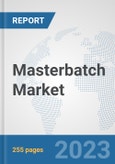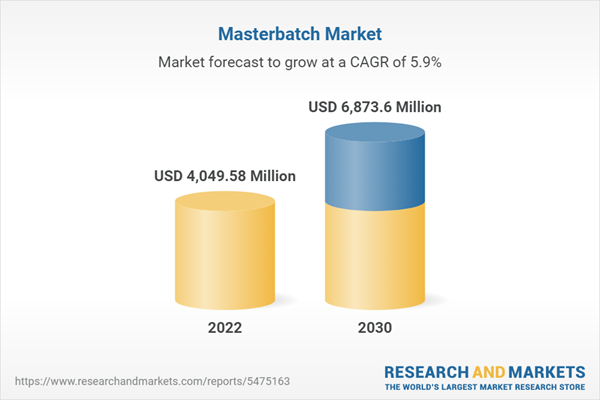The masterbatch market refers to the industry segment involved in the production and distribution of masterbatches, which are concentrated forms of additives and pigments used in the colouring and modification of plastics, rubber, and other polymer materials. These masterbatches are typically produced by blending additives and pigments with a carrier resin to create a highly concentrated and easily dispersible form. Additionally, the major driving factor in the masterbatch market is the growing demand for plastics and polymer-based products across various industries, including packaging, automotive, construction, and consumer goods. This demand is primarily attributed to the versatility, cost-effectiveness, and durability of plastic materials. As manufacturers seek to enhance the visual appeal, performance, and functionality of plastic products, they rely on masterbatches to achieve desired color shades, UV resistance, flame retardancy, and other desirable properties. Thus, the increasing adoption of plastics in various applications fuels the demand for masterbatches, making them a crucial component of the polymer industry's growth and innovation.
Packaging is the fastest-growing segment in the masterbatch market due to increasing demand for colorful and UV-resistant packaging materials in industries such as food, beverages, and consumer goods. Masterbatches offer efficient and cost-effective solutions for enhancing the appearance and performance of packaging materials, driving their growth in this market. Masterbatches find extensive use in various packaging applications, encompassing both rigid and flexible packaging. The Asia-Pacific region is experiencing a surge in demand for packaged food, driven by shifting lifestyles, increasing disposable incomes, a rising number of working professionals, and a growing preference for fast food. Additionally, the North American food packaging market is thriving due to the substantial reliance on packaged foods and the strong presence of the food processing industry. Notably, major food processing giants such as PepsiCo, Tyson Foods, and Nestle have substantial requirements for packaging materials. Considering all these factors, it is highly probable that the global masterbatches market will experience significant growth throughout the forecast period.
The Asia Pacific region holds major market share in the global masterbatch market. This leadership position is attributed to several factors, including the region's robust industrial manufacturing base, rapid urbanization, and the burgeoning demand for plastics across various sectors such as packaging, automotive, and construction. Furthermore, plastic is a fundamental component in the production of masterbatch, serving as the carrier resin. China boasts one of the world's most substantial food industries, and it is projected to experience steady expansion in the foreseeable future. This growth can be attributed to the growing demand for tailored packaging solutions within the food sector, encompassing items such as microwaveable foods, snacks, and frozen foods, in addition to the escalating trend in food exports. Increase food industries will ultimately raise the use of plastic which direct enhance the masterbatch market. For instance, in 2021, China hold the top position as the world's leading plastic materials producer, accounting for a substantial 32% of global plastic production. Additionally, the region benefits from a cost-effective labor force and extensive raw material availability. With its thriving economies and increasing adoption of advanced technologies, the Asia Pacific region continues to play a pivotal role in shaping the global masterbatch industry.
Report Findings
1) Drivers
- Growing demand for lightweight automotive components and sustainable packaging drives the masterbatch market.
- Increasing emphasis on color and appearance enhancement in plastic products is fueling the demand for color masterbatches.
2) Restraints
- Environmental concerns and regulations regarding plastic waste are restraining the masterbatch market's growth.
3) Opportunities
- Innovations in masterbatch technology offer opportunities for enhanced product performance and customization.
Research Methodology
A) Primary Research
The primary research involves extensive interviews and analysis of the opinions provided by the primary respondents. The primary research starts with identifying and approaching the primary respondents, the primary respondents are approached include1. Key Opinion Leaders
2. Internal and External subject matter experts
3. Professionals and participants from the industry
The primary research respondents typically include
1. Executives working with leading companies in the market under review2. Product/brand/marketing managers
3. CXO level executives
4. Regional/zonal/ country managers
5. Vice President level executives.
B) Secondary Research
Secondary research involves extensive exploring through the secondary sources of information available in both the public domain and paid sources. Each research study is based on over 500 hours of secondary research accompanied by primary research. The information obtained through the secondary sources is validated through the crosscheck on various data sources.The secondary sources of the data typically include
1. Company reports and publications2. Government/institutional publications
3. Trade and associations journals
4. Databases such as WTO, OECD, World Bank, and among others.
5. Websites and publications by research agencies
Segment Covered
The global masterbatch market is segmented on the basis of type, polymer, and end user.The Global Masterbatch Market by Type
- White
- Black
- Colour
- Additive
- Others
The Global Masterbatch Market by Polymer
- Polypropylene
- Polyethylene
- Polyvinyl Chloride
- Polyethylene Terephthalate
- Others
The Global Masterbatch Market by End User
- Packaging
- Building & Construction
- Automotive
- Consumer Goods
- Agriculture
Company Profiles
The companies covered in the report include- LyondellBasell Industries Holdings B.V.
- Avient Corporation
- Americhem
- Ampacet Corporation
- Astra Polymers
- PLASTIKA KRITIS
- Cabot Corporation
- Plastiblends
- Tosaf Compounds Ltd.
- Penn Color Inc.
What does this Report Deliver?
1. Comprehensive analysis of the global as well as regional markets of the masterbatch market.2. Complete coverage of all the segments in the masterbatch market to analyze the trends, developments in the global market and forecast of market size up to 2030.
3. Comprehensive analysis of the companies operating in the global masterbatch market. The company profile includes analysis of product portfolio, revenue, SWOT analysis and latest developments of the company.
4. Growth Matrix presents an analysis of the product segments and geographies that market players should focus to invest, consolidate, expand and/or diversify.
This product will be delivered within 1-3 business days.
Table of Contents
Companies Mentioned
- LyondellBasell Industries Holdings B.V.
- Avient Corporation
- Americhem
- Ampacet Corporation
- Astra Polymers
- PLASTIKA KRITIS
- Cabot Corporation
- Plastiblends
- Tosaf Compounds Ltd.
- Penn Color Inc.
Table Information
| Report Attribute | Details |
|---|---|
| No. of Pages | 255 |
| Published | May 2023 |
| Forecast Period | 2022 - 2030 |
| Estimated Market Value ( USD | $ 4049.58 Million |
| Forecasted Market Value ( USD | $ 6873.6 Million |
| Compound Annual Growth Rate | 5.9% |
| Regions Covered | Global |
| No. of Companies Mentioned | 10 |









